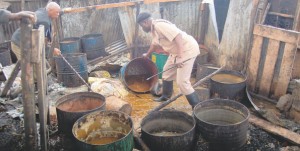Dangerous Alcohol: Chang’aa
Chang’aa is basically the Kenyan version of moonshine. It’s distilled from grains and it is very, very potent.
The literal translation of Chang’aa is “kill me quick” and by all accounts, it will obliterate anyone who drinks it. Not to mention that it is often toxic, and has killed or blinded hundreds of drinkers.
Chang’aa is brewed in places like the Korogocho slum, one of the poorest areas in the Kenyan capital of Nairobi. Its 120,000 residents occupy one square kilometer near the city trash dump. Nearly three-quarters of the population are under 30 years old, and many are alcoholics.
One dollar American will buy you four glasses of Chang’aa, which is why it is so popular in slums like Korogocho. Unethical vendors often spike the home brewed drink with anything from jet fuel to embalming fluid. The brews are also often contaminated with feces and dead rats. But the price and potency are more tempting than the heavily taxed beers that are common in wealthier areas of Kenya.
The Kenyan government legalized the traditional home-brewed spirit in 2010, in an effort to take business away from establishments where toxic chemicals are added to the brew to make it stronger. Under the new liquor laws, Chang’aa must be bottled, sealed, and marked with a warning label. If the brew contains any toxic additives, like methanol, the manufacturer can be fined and/or jailed.
Legalization may provide employment opportunities for some of the women in Kenya, who would be able to distill it at home. However, readily available Chang’aa, which would still be sold very cheaply, may be dangerous. The rates of alcoholism in the slums may increase, and opportunities for treatment are very limited. In Korogocho, help is limited to an Alcoholic Anonymous meeting hosted by local Catholic priests. In addition, liquor that costs as much as water could have other costs like increasing rates of crime, violence towards women and children, unsafe sex, and health problems.
In addition, quality control doesn’t really exist in these slum distilleries. Even though many are no longer adding potentially toxic “kickers” to the drink, it is still likely to be contaminated because they don’t have proper disinfection or storage.
In addition, although legalization makes it easier to distill and drink Chang’aa in the open, brewing is still an illegal underground operation. Local brewers often pay off police to keep from being shut down.
Eventually, Chang’aa may become commercially manufactured and government inspected. However, local Chang’aa is still a long way from being safe to consume. In addition, though the legalization has proven profitable for many slum residents, it may cause more problems than it solves in Kenya’s poorest areas. The production and control of Chang’aa is still controlled, for the most part, by local gangs, and gang violence in the area has increased as a result. Poor health and alcoholism are also rampant in the slums due to the dangerous drink, while access to health care and addiction treatment remains very poor.
Source:
http://www.vice.com/read/really-strange-brew-0000009-v18n10


